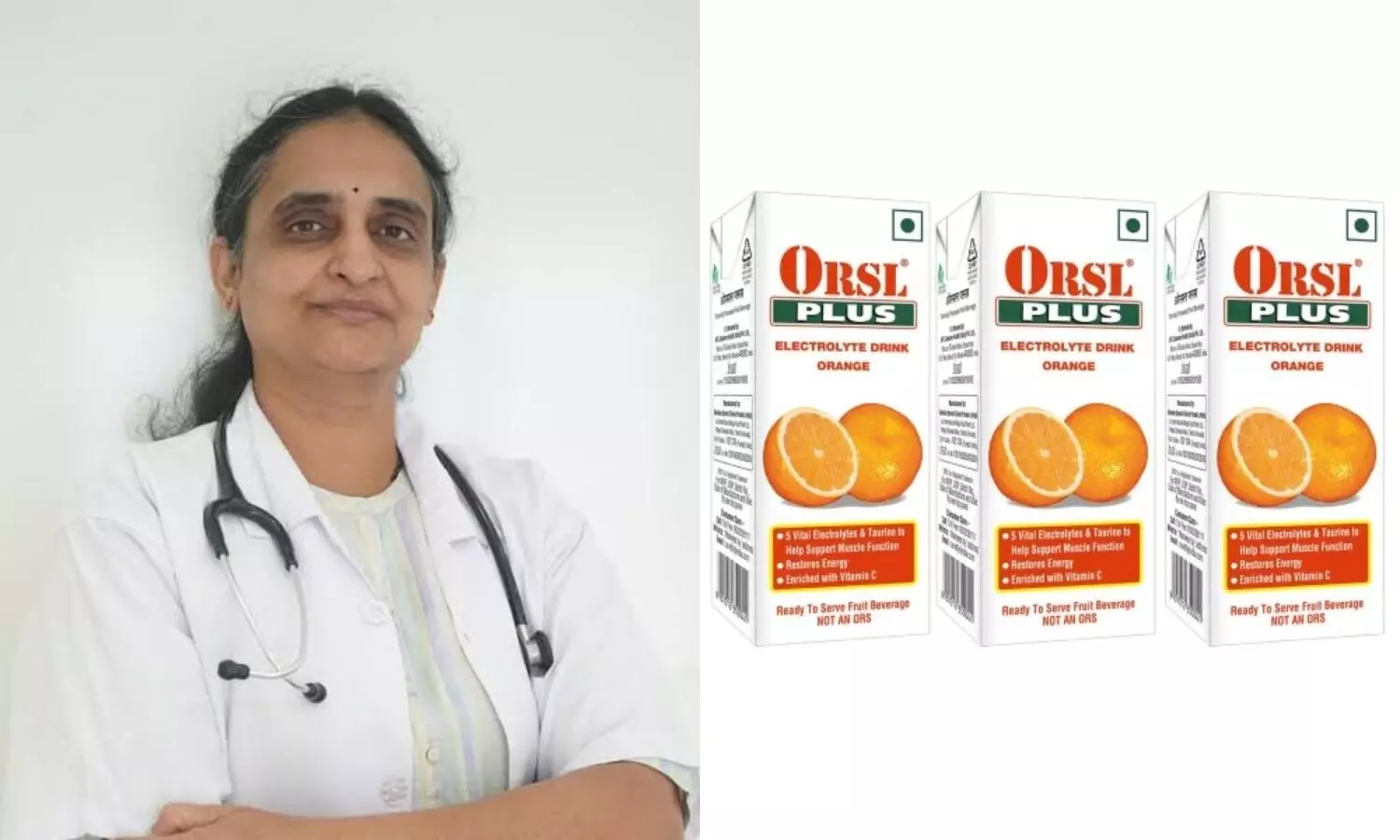FSSAI restores ban on fake ‘ORS’ drinks, upholds Dr Sivaranjani’s 8-year battle
FSSAI restores ban on misuse of ‘ORS’ label for sugary drinks, upholds Dr Sivaranjani’s 8-year battle
By - Anoushka Caroline Williams |
FSSAI restores ban on fake ‘ORS’ drinks, upholds Dr Sivaranjani’s 8-year battle
Hyderabad: The ORS cannot be used anymore on any food or beverage label unless it conforms to the World Health Organisation (WHO)-recommended Oral Rehydration Salts (ORS) formula.
The Food Safety and Standards Authority of India (FSSAI) has revoked its previous permissions and reinstated its April 8, 2022, order that directed the ban.
This crucial decision follows an eight-year-long campaign by Hyderabad-based paediatrician and social activist Dr Sivaranjani Santosh, who relentlessly fought against the misuse of the medical term ‘ORS’ by several companies selling sugar-laden beverages under deceptive labelling.
‘ORS is not a soft drink, it’s a life-saving drug’
“ORS, or Oral Rehydration Solution, is not a soft drink. It’s a life-saving drug,” said Dr Sivaranjani Santosh, speaking to NewsMeter. “It’s prescribed during diarrhoea, vomiting or when a patient can’t eat or drink properly. It helps replace the salts and water the body loses.”
She explained that WHO recommends the reduced osmolarity ORS formula, brought down from 311 to 245 milliosmoles per litre based on WHO findings that it is more effective in reducing dehydration and hospitalisation.
The WHO-prescribed formula, to be mixed in one litre of water, includes:
• Sodium chloride: 2.6 g
• Glucose (anhydrous): 13.5 g
• Potassium chloride: 1.5 g
• Trisodium citrate dihydrate: 2.9 g
However, Dr Sivaranjani said many so-called ‘ORS’ tetra packs sold in the market contained up to 110 grams of sugar per litre.
“That’s nearly eight times more than the real formula. This excessive sugar actually pulls water into the gut and worsens diarrhoea instead of curing it,” she said.
Diarrhoea worsened after consuming ORS duplicates
The problem, she recalls, began more than a decade ago when companies launched fruit-flavoured ORS L tetra packs with attractive packaging. “They marketed these drinks aggressively in hospitals, schools and pharmacies. Over time, they replaced genuine ORS sachets on pharmacy shelves,” she said.
Children admitted with diarrhoea often worsen after consuming these drinks.
“We realised the ORS L people were buying was the problem,” she said. “The public thought they were hydrating, but they were drinking high-sugar beverages that increased dehydration.”
According to her, 13 per cent of deaths in children under five in India are due to diarrhoea, making this misinformation potentially fatal.
“If a child with diarrhoea drinks a high-sugar liquid labelled as ORS, the condition can worsen. But such deaths are recorded as diarrhoeal deaths, not as product-related,” she explained.
Writing, warning and waiting
In 2021, Dr Sivaranjani wrote to the Central Drugs Standard Control Organisation (CDSCO) with scientific data and product samples, urging action.
“They said they never approved such labelling,” she said. “By then, the product had changed hands from the original manufacturer to a multinational giant and their marketing became more aggressive.”
Ban order removed within two months
When the CDSCO redirected her to the FSSAI and the Health Ministry, the matter bounced between departments. She finally wrote to the Central Health Secretary and the Prime Minister’s Office, demanding action.
The FSSAI initially issued an order on April 8, 2022, prohibiting any food or beverage company from using the word ‘ORS’ unless it followed the WHO’s formula. “That order gave me hope,” she said. “But within two months, on July 14, 2022, they reversed it, saying established trademarks could continue using the term with a small disclaimer.”
A subsequent February 2024 modification allowed new companies to also use ‘ORS’ branding again, with a disclaimer. “But the disclaimer was printed so small, like an ant, it was meaningless,” Dr Sivaranjani said.
Diabetic patients are especially at risk
Unwilling to give up, Dr Sivaranjani filed a Public Interest Litigation (PIL) in the Telangana High Court challenging the FSSAI’s reversal. The respondents included the companies, the Central Government, the Health Ministry and the FSSAI itself.
Later, several medical organisations, including the Endocrine Society of India and the Women Paediatricians Forum, supported her case.
“These drinks are dangerous even for diabetic patients. Imagine a diabetic person drinking a sugary liquid thinking it’s medicine,” she said.
To strengthen her case, she collected video evidence from pharmacies selling misleading products and case reports from doctors. “If you ask for ORS, they’ll hand you these tetra packs. Most people don’t know the difference,” she said.
The public speaks up
Her fight gained public traction after she shared her story on social media.
“I had written to officials for years with no result. When I finally made an emotional post before a court hearing, thousands of people, mothers, doctors, and journalists rallied behind me. That’s when it began to get attention,” she recalled.
Cough syrup deaths prompted action
The turning point came earlier this year after the cough syrup contamination incident that led to a doctor’s arrest.
“It made people realise that regulatory failures can cost lives. The same thing could happen with ORS misuse,” she said.
Soon after widespread media coverage, the FSSAI issued its latest order, cancelling the 2022 and 2024 relaxations and reaffirming that only WHO-formula ORS can bear the name ‘ORS.
A doctor’s courage and a family’s strength
“This battle took eight years. I had to go against powerful companies and even question my own professional academy for taking sponsorships,” she said. “My family was very worried, but they stood by me.”
Calling the order a ‘public health victory,’ she added, “ORS must remain a drug. It cannot be commercialised. When you misuse a medical term for marketing, you’re endangering lives.”
Her message to the public is simple: “When you buy ORS, always check the label. It must say ‘WHO-recommended formula’. Anything else is not ORS.”